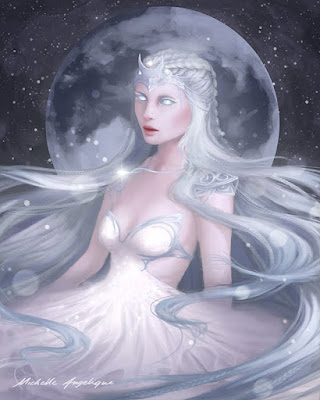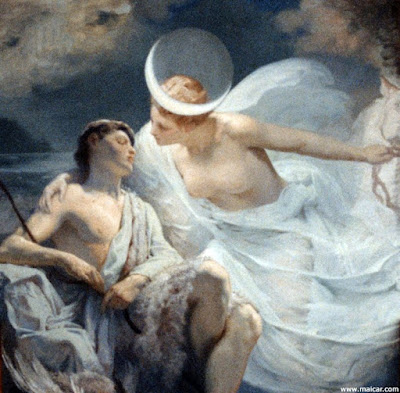SELENE, the moon, came out at night to light up the world while her brother, Helios, was resting. Slowly she drove her milk-white horses across the sky, and her pale moonbeams fell gently on the sleeping earth where all was peace and quiet.
One night Selene's soft light fell on Endymion, a young shepherd, who was sleeping beside his flock. She stopped to look at him. He was smiling in his sleep and was so young and handsome that she completely lost her heart to him. She drove through the night, but she could not get him out of her mind.
When her duties were over, she went to Zeus and asked him to grant Endymion eternal sleep so he would stay forever young and handsome. She had learned from her sister, Eos, not to ask for eternal life for a mortal and be left with a grasshopper on her hands.
Zeus granted Selene's wish and Endymion slept on and on, smiling in his sleep. He dreamed that he held the moon in his arms. But it was not a dream after all, for Selene bore her husband fifty daughters, all pale and beautiful as their mother and sleepy as their father.
In Selene’s magic light, river-gods rose form silvery streams to inspect their river beds, and hills trembled under the hoofs of the wild centaurs.
Laughing nymphs and bleating satyrs danced to the music of Pan, god of nature, master of them all.
One night Selene's soft light fell on Endymion, a young shepherd, who was sleeping beside his flock. She stopped to look at him. He was smiling in his sleep and was so young and handsome that she completely lost her heart to him. She drove through the night, but she could not get him out of her mind.
When her duties were over, she went to Zeus and asked him to grant Endymion eternal sleep so he would stay forever young and handsome. She had learned from her sister, Eos, not to ask for eternal life for a mortal and be left with a grasshopper on her hands.
Zeus granted Selene's wish and Endymion slept on and on, smiling in his sleep. He dreamed that he held the moon in his arms. But it was not a dream after all, for Selene bore her husband fifty daughters, all pale and beautiful as their mother and sleepy as their father.
In Selene’s magic light, river-gods rose form silvery streams to inspect their river beds, and hills trembled under the hoofs of the wild centaurs.
Laughing nymphs and bleating satyrs danced to the music of Pan, god of nature, master of them all.


Comments
Post a Comment